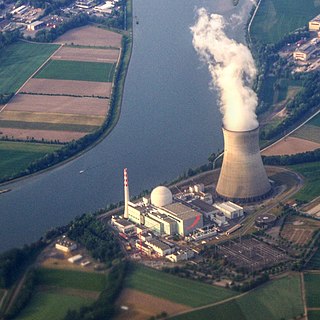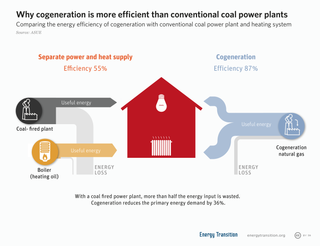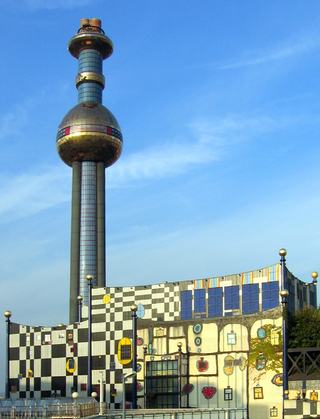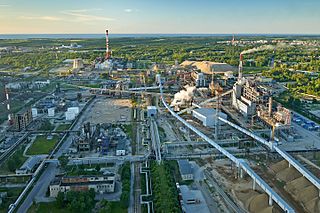Related Research Articles

Nuclear power is the use of nuclear reactions to produce electricity. Nuclear power can be obtained from nuclear fission, nuclear decay and nuclear fusion reactions. Presently, the vast majority of electricity from nuclear power is produced by nuclear fission of uranium and plutonium in nuclear power plants. Nuclear decay processes are used in niche applications such as radioisotope thermoelectric generators in some space probes such as Voyager 2. Reactors producing controlled fusion power have been operated since 1958 but have yet to generate net power and are not expected to be commercially available in the near future.

Lignite, often referred to as brown coal, is a soft, brown, combustible sedimentary rock formed from naturally compressed peat. It has a carbon content around 25–35% and is considered the lowest rank of coal due to its relatively low heat content. When removed from the ground, it contains a very high amount of moisture, which partially explains its low carbon content. Lignite is mined all around the world and is used almost exclusively as a fuel for steam-electric power generation.

Geothermal energy is thermal energy extracted from the Earth's crust. It combines energy from the formation of the planet and from radioactive decay. Geothermal energy has been exploited as a source of heat and/or electric power for millennia.

Cogeneration or combined heat and power (CHP) is the use of a heat engine or power station to generate electricity and useful heat at the same time.

District heating is a system for distributing heat generated in a centralized location through a system of insulated pipes for residential and commercial heating requirements such as space heating and water heating. The heat is often obtained from a cogeneration plant burning fossil fuels or biomass, but heat-only boiler stations, geothermal heating, heat pumps and central solar heating are also used, as well as heat waste from factories and nuclear power electricity generation. District heating plants can provide higher efficiencies and better pollution control than localized boilers. According to some research, district heating with combined heat and power (CHPDH) is the cheapest method of cutting carbon emissions, and has one of the lowest carbon footprints of all fossil generation plants.

Moscow State Institute of International Relations (MGIMO) is an institute of higher education located in Moscow, Russia. The institute is run by the Russian Ministry of Foreign Affairs.

Several common ethanol fuel mixtures are in use around the world. The use of pure hydrous or anhydrous ethanol in internal combustion engines (ICEs) is only possible if the engines are designed or modified for that purpose, and used only in automobiles, light-duty trucks and motorcycles. Anhydrous ethanol can be blended with gasoline (petrol) for use in gasoline engines, but with high ethanol content only after engine modifications to meter increased fuel volume since pure ethanol contains only 2/3 of the BTUs of an equivalent volume of pure gasoline. High percentage ethanol mixtures are used in some racing engine applications as the very high octane rating of ethanol is compatible with very high compression ratios.
The Doctor of Engineering is a research doctorate in engineering and applied science. An EngD is a terminal degree similar to a PhD in engineering but applicable more in industry rather than in academia. The degree is usually aimed toward working professionals.
The International Association of Oil & Gas Producers (IOGP) is the petroleum industry's global forum in which members identify and share best practices to achieve improvements in health, safety, the environment, security, social responsibility, engineering and operations.
Public water supply and sanitation in Germany is universal and of good quality. Some salient features of the sector compared to other developed countries are its very low per capita water use, the high share of advanced wastewater treatment and very low distribution losses. Responsibility for water supply and sanitation provision lies with municipalities, which are regulated by the states. Professional associations and utility associations play an important role in the sector. As in other EU countries, most of the standards applicable to the sector are set in Brussels. Recent developments include a trend to create commercial public utilities under private law and an effort to modernize the sector, including through more systematic benchmarking.

Efficient energy use, or energy efficiency, is the process of reducing the amount of energy required to provide products and services. There are many technologies and methods available that are more energy efficient than conventional systems. For example, insulating a building allows it to use less heating and cooling energy while still maintaining a comfortable temperature. Another method is to remove energy subsidies that promote high energy consumption and inefficient energy use. Improved energy efficiency in buildings, industrial processes and transportation could reduce the world's energy needs in 2050 by one third.

The oil shale industry is an industry of mining and processing of oil shale—a fine-grained sedimentary rock, containing significant amounts of kerogen, from which liquid hydrocarbons can be manufactured. The industry has developed in Brazil, China, Estonia and to some extent in Germany and Russia. Several other countries are currently conducting research on their oil shale reserves and production methods to improve efficiency and recovery. Estonia accounted for about 70% of the world's oil shale production in a study published in 2005.
Wind power in Ohio has a long history. As of 2016, Ohio had 545 megawatts (MW) of utility-scale wind power installations, responsible for generating 1.1% of the state's electricity. Over 1000 MW more were under construction or pending approval. Some installations have become tourist attractions. There has been a sudden increase in generating capacity, as the total wind power capacity in the state was just 9.7 MW in 2010. By 2019, there were 738 MW of capacity, which generated 1.71% of Ohio's electricity.
Feed-in electricity tariffs (FiT) were introduced in Germany to encourage the use of new energy technologies such as wind power, biomass, hydropower, geothermal power and solar photovoltaics. Feed-in tariffs are a policy mechanism designed to accelerate investment in renewable energy technologies by providing them remuneration above the retail or wholesale rates of electricity. The mechanism provides long-term security to renewable energy producers, typically based on the cost of generation of each technology. Technologies such as wind power, for instance, are awarded a lower per-kWh price, while technologies such as solar PV and tidal power are offered a higher price, reflecting higher costs.
In electrical power engineering, fault ride through (FRT), sometimes under-voltage ride through (UVRT), or low voltage ride through (LVRT), is the capability of electric generators to stay connected in short periods of lower electric network voltage. It is needed at distribution level to prevent a short circuit at HV or EHV level from causing a widespread loss of generation. Similar requirements for critical loads such as computer systems and industrial processes are often handled through the use of an uninterruptible power supply (UPS) or capacitor bank to supply make-up power during these events.

The Fessenheim Nuclear Power Plant is located in the Fessenheim commune in the Haut-Rhin department in Grand Est in north-eastern France, 15 km (9.3 mi) north east of the Mulhouse urban area, within 1.5 km (0.93 mi) of the border with Germany, and approximately 40 km (25 mi) from Switzerland. Unit 1 was closed in February 2020 and unit 2 on 29 June 2020.

The Energiewende is the ongoing energy transition by Germany. The new system intends to rely heavily on renewable energy, energy efficiency, and energy demand management.

An energy transition is a major structural change to energy supply and consumption in an energy system. Currently, a transition to sustainable energy is underway to limit climate change. Most of the sustainable energy is renewable energy. Therefore, another term for energy transition is renewable energy transition. The current transition aims to reduce greenhouse gas emissions from energy quickly and sustainably, mostly by phasing-down fossil fuels and changing as many processes as possible to operate on low carbon electricity. A previous energy transition perhaps took place during the Industrial Revolution from 1760 onwards, from wood and other biomass to coal, followed by oil and later natural gas.

Volker Bernd Beckers, is a German business executive, and a former Group CEO of RWE npower.
References
- ↑ "BDEW-German Association of Energy and Water Industries". Clean Energy Wire. 2014-09-24. Archived from the original on 2019-06-02. Retrieved 2019-07-25.
- ↑ BDEW. "Impressum". BDEW (in German). Archived from the original on 2019-06-01. Retrieved 2019-07-25.
- ↑ "Chambers and associations". deutschland.de. 2012-08-14. Retrieved 2019-07-25.